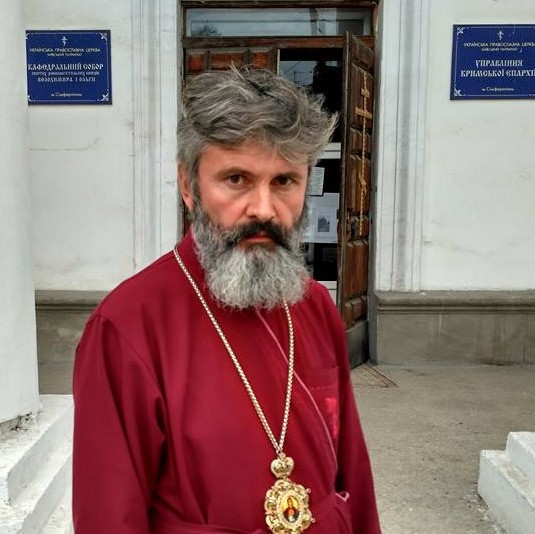• Topics / Human Rights Abuses in Russian-occupied Crimea
Ukrainian Orthodox Church congregation refused registration in Russian-occupied Crimea

The Russian-controlled ‘justice ministry’ in occupied Crimea has rejected the application for registration lodged by Archbishop Klyment, Head of the Orthodox Church of Ukraine in Crimea. This is not yet a final refusal, but the Archbishop fears that Russia will ultimately turn down the application, and suggests that Ukraine should take reciprocal measures against the Orthodox Church in Ukraine under the Moscow Patriarchate.
Klyment has been told that the package of documents for registration of a Ukrainian Orthodox congregation that they submitted “do not meet the demands of Russian legislation on religion and freedom of conscience”. They have now been given a timeframe in which to “remove these failings”. He says that for the moment, this is a question of paperwork, and not a rejection. He does, however, say he fears that they may not receive registration. He notes that once their charter has passed the ‘legal assessment’, it will be sent for a ‘religious expert assessment’ to Moscow, which will determine whether they get registration or not.
“If [we do] not, then the question for me arises: if conditions of Russian legislation are applied with respect to me on the territory of Crimea, then in mainland Ukraine the same demands should be put to the Ukrainian Orthodox Church under the Moscow Patriarchate. And the demand is that they should re-register, according to Ukrainian legislation, as the Russian Orthodox Church”.
There are very real grounds for the Archbishop’s concerns, with none of these abated by the report on this refusal by the Russian-controlled Crimean KrymInform. The title of his report is “The Russian justice ministry has refused to register an organization of Ukrainian schismatics in Crimea”. The text itself is even more offensive, speaking of the refusal to register “a religious organization on the application of the leader of the Ukrainian schismatics Pavlo Kushch, who calls himself Archbishop Klyment.”
Klyment does not ‘call himself’, but is, the Archbishop of the Orthodox Church of Ukraine in Crimea. He announced on 23 March that he had submitted documents to register the Ukrainian Orthodox congregation in Crimea, a move that he had avoided for five years. He explained that the occupation authorities had given him three months to organize such documentation, and he saw no option now but to do so, since it was now a question of the eparchy’s very existence in occupied Crimea.
The occupation regime has used lack of registration as a legal entity under Russian legislation as an excuse for seizing places of worship, etc.
The move now is not unexpected. In an interview to Krym.Realii on 13 February, Klyment said:
“You know, when the principled position of the Ukrainian government is that “we won’t accept anything from Crimea” and they reject all responsibility for what is happening in Crimea, I don’t know what I should do now, and how. If there is a choice between the Church, religious services and people (and the stand on registration), then I choose the Church”.
Since the Church itself cannot register under Russian legislation on illegally occupied Ukrainian territory, the Archbishop is seeking registration for a Ukrainian Orthodox congregation only.
All faiths, expect the Orthodox Church under the Moscow Patriarchate, have come under fire in occupied Crimea, but the Orthodox Church under the Kyiv Patriarchate was the first to be attacked, probably because of its openly pro-Ukrainian position and its public statement on 11 March 2014 condemning Russian occupation of Crimea.
In just the first year, 38 out of 46 parishes ceased to exist, and in at very least three cases, churches were seized by the occupation regime: in Sevastopol; Simferopol and in the village of Perevalne. Of 25 priests in 2014, by October 2018 there were only four. There had been nine until the summer of 2018, however five had left for mainland Ukraine after a number of searches of the homes of members of the Ukrainian Cultural Centre and after it became clear that the lack of a Russian passport was likely to be used against them.
Lack of such registration has given Russia weapons to use in depriving the Church and believers of their places of worship and of other rights. Other methods have also been used, including the threat of physical reprisals by the armed paramilitaries, especially in 2014, vulnerability over the lack of Russian citizenship and also economic intimidation. There have been threats, for example, against those businesspeople who provided premises for the Church to use, with this a reason why many religious communities have lost their places of worship.
Klyment reported on 8 February that he had received a writ ordering that he leave the Cathedral of Vladimir and Olga in occupied Simferopol which was now under the so-called ministry of property and land relations. The occupation authorities were thus terminating the agreement between the Church and the Crimean Property Fund in 2002, and the Church was given 30 days to vacate the building. This, the Archbishop warned, was likely to lead to eight parishes in rural areas also being forced to close.
During a press conference in Kyiv on 12 February, Klyment called on the international community, and on the ambassadors of European countries, the USA and Canada in Ukraine to take the situation under their personal control. If pressure on the Church intensifies, he said, personal sanctions were crucial against those involved in terminating the Church’s lease agreement.
Klyment himself has faced persecution, and it may have been swift protest in Ukraine and beyond that held Russia from imprisoning him on insultingly absurd charges on 3 February 2019 (details here).





